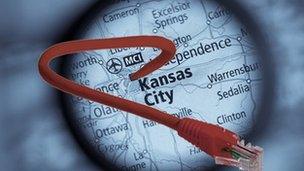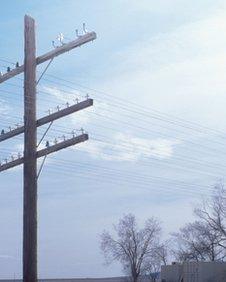Google Fiber offers super-fast broadband to Kansas City
- Published

Some Kansas residents are already using the service
Google has begun to connect US homes in Kansas City to super-fast broadband, offering residents speeds of up to 1Gbps (gigabit per second).
People living in the "fibrehood" area of Hanover Heights are among the first to use the service.
They are reporting speeds of about 700Mbps (megabits per second).
The product poses a challenge to established cable companies which typically charge more money with slower connections.
Google says it hopes its package will persuade people to spend longer on the web and try out new services.
However, it will need to convince consumers that they would benefit from access to such fast speeds.
In a blog post, external, Google Fiber's director of service delivery Alana Karen promised a "great service" for residents in Kansas City - which straddles the border between the states of Kansas and Missouri.
Curiosity project
Google is able to make the foray into broadband installation because it has been buying up so-called dark fibre from telecoms firms in the US in order to link up its data centres which are dotted around the US.

The service will be delivered mainly by overhead cables
It has also been investing in cheap fibre that has been laid by companies that have subsequently gone bankrupt before completing rollouts.
The service offers Fibre to the Home (FTTH) and is delivered via overhead cables on the poles that also bring power to homes.
Most analysts agree that the service has been competitively priced. The gigabit service is being offered at $70 (£44) per month with no installation charge. This package also comes with 1TB (terabyte) of storage on Google Drive.
Alternatively subscribers can opt for a broadband plus TV service at a price of $120 (£75).
The third option is to pay a one-off $300 (£189) installation fee in return for free broadband at speeds of 5Mbps.
"One could be unkind and suggest that the TV side of Google Fiber shows that TV over broadband is the rather mundane killer app, when for over decade we have had IPTV in the UK," said Andrew Ferguson, founder of news site ThinkBroadband.
As well as offering residents fast speeds, Google is also hoping to score points for excellent customer service.
"We'll show up when we're supposed to... we'll clean up any mess; each installer carries a vacuum clean. And we'll answer your questions and teach you about your devices - don't be afraid to ask us questions, or ask us to explain something again in simple language," said Ms Karen, in a blog post.
Sci-fi future
Some have questioned whether the project represents a serious commitment to broadband infrastructure.
"If Google Fiber has an ambition to roll out its fibre and TV services to more cities across the US then the project becomes much more than a curiosity, but with Google so far not connecting businesses it has the hallmarks of a grand experiment," said Mr Ferguson.
Steven Hartley, an analyst with research firm Ovum, thinks it is most likely that Google will use the city as a test-bed.
"This isn't the start of Google launching fibre networks all around the world. But it can use it to test how people use these networks," he said.
The project was first announced in 2010. Interest in the idea was huge with more than 1,000 towns and cities applying to be part of it.
Since Kansas City was selected, web and digital entrepreneur have moved into the city in the hope of benefiting from the new super-fast speeds.
"There are probably people who would sell their soul to be living in a neighbourhood of Kansas City that has access to the service, as they see fibre connectivity as part of the sci-fi future," said Mr Ferguson.
But whether such a project can be repeated in other cities around the globe remains to be seen.
"Fibre to the Home is certainly the gold-plated standard that to the best of our current knowledge is future proof, the problem being that unless every city in the world can find another 'Google' sitting on mountains of cash we will have to wait a few more years," he said.
- Published27 February 2012
- Published28 February 2012